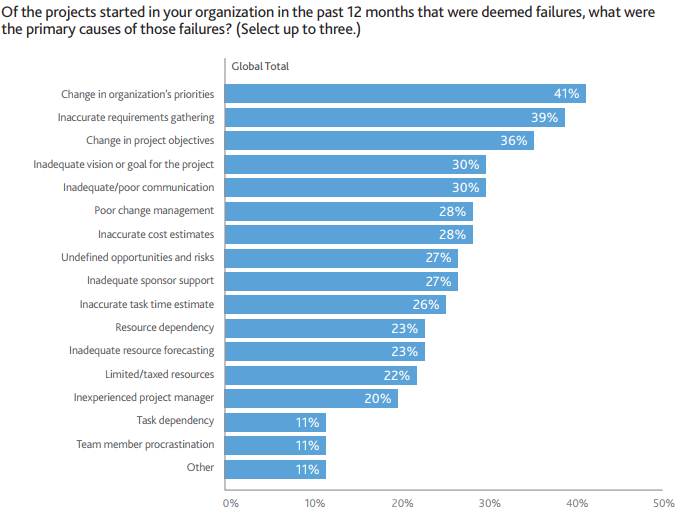PMP certification is the most popular and globally recognized certification in project management. There is no other certification in project management which can be compared with PMP.
Why PMP Certification?
It’s just because PMP is beneficial for both the employees and employers. Yes, it may sound odd, but it is a fact that many companies across different industries use PMP as a requirement for project managers. Processes and knowledge areas that are taught in the PMP exam preparation have been integrated into the work that is done by the project managers in companies.
Let’s dig deep into it and find out why the demand for PMP certified professionals is increasing exponentially.
Here’re Top 5 Reasons Why Employers Want PMP Certification
1. PMP Certified Professionals have Greater Chances to Make Projects Successful
After years of research and industrial liaison, PMI has introduced its project management framework, which forms the basis of PMP. The knowledge gained by PMP certified professionals enables them to manage the projects in much more efficient, robust, and smart manner when compared with their counterparts who are not PMP certified. The success of projects run by PMP certified people is much higher; they save a lot of time and costs by efficient project management.
According to the Pulse of the Profession study conducted by PMI in 2015 “When more than one-third of their project managers are PMP-certified, organizations complete more of their projects on time, on budget and meeting original goals.”
Similarly, Pulse of the Profession study conducted by PMI in 2017 shows that the top reasons for failed projects were poor project management practices (shown in the figure below)

Therefore, PMP has earned an excellent reputation among employers, because naturally, every organization wants to minimize the costs of its projects and maximize output. PMP certified people play a vital role in achieving this objective; hence the value of PMP is increasing day by day in the eye of employers.
Practice does not make perfect. Only perfect practice makes perfect.
Vince Lombardi
Whizlabs Practice Tests help students to get mentally prepared for the actual PMP certification exam. Practicing several times through these PMP® practice tests makes you better prepared for the real one.
2. Potential Clients want PMP Certified People in the Team
Yes, it is true, many potential clients have a mandatory requirement of having PMP certified professionals because they understand the importance of proper project management and they don’t want their project to fail, over budget or schedule. They know that PMP certified professionals will manage their projects in a much better way than non-certified ones. As a result, many employers prefer to have PMPs in their team as it will maximize their chances of winning new projects.
Also Read: 5 Must Read PMP Certification Books in 2017
3. It Standardizes and Streamlines Project Management Practices in Organization
Having more PMP’s in the organization means there will be standard project management procedures in the organization. It’s because PMPs across the world tend to follow same project management procedures and framework; and results in higher harmony and collaboration at the project, program, and even portfolio-level management.
For example, PMP lays great importance on communication during the projects and advises to make a proper communication plan inside project plan. Having more PMPs in the organization ensures that proper connection to all the relevant stakeholders is being made and, all the prospects of the projects are being communicated to higher authorities. This results in active participation of top management and contributes significantly to the success of projects.
Pulse of the Profession study conducted by PMI in 2017 also confirms “Organizations that invest in proven project management practices waste 28 times less money because more of their strategic initiatives are completed successfully”.
4. PMP is More than a Certification
PMP is not just an ordinary certification where you just give exam and pass out, without bothering about the knowledge gained for the rest of your life. PMI goes beyond testing to assess PMP certification candidates by using the 5E’s of project management competence:
- Education for Eligibility: A minimum number of contact hours in education are required for eligibility.
- Experience: A minimum number of hours that are aligned with specific project management tasks are required.
- Examination: A scenario-based multiple-choice examination format is used and provides a highly reliable way to assess project management competence.
- Ethics: All candidates and certification holders must adhere to the PMI Code of Ethics and Professional Conduct.
Education for Certification Maintenance: PMI’s Continuing Certification Requirements (CCR) program also reflects these best practices. The CCR program ensures that certified practitioners maintain and continue to develop their competence in project management, unlike other certification programs that are lifetime achievements. This is one of the best aspects of PMP, as it keeps certification holders connected with updated knowledge and techniques in the project management realm.
Therefore, any organization hiring PMPs has an automatic advantage of not bothering about the above-mentioned aspects, neither do they need any background checks about experience or education.The cherry on the top is that their PMP certified employees will always be equipped with the latest knowledge, which in-turn can greatly contribute to the success of the projects.
5. PMP Certification Shows, You are Serious about Project Management Profession
Becoming PMP certified is not an easy task; it requires a huge investment in terms of time, money, and mental efforts. Therefore, a PMP certified individual proves to the employers that he/she is serious about the project management profession, and this is his/her career path now. This is important for many organizations because they invest a significant amount of time and efforts to train and mold their employees according to their organizational procedures and methodologies. Some organizations even conduct training and sponsor certifications for their project management department employees. Hence, they can’t afford to hire someone who is just a mere part-timer in the field of project management and is inclined towards changing career paths.
PMP certified individuals rarely change their career paths, and this is a great blessing for the organizations who invest in their employees.
[divider /]
Conclusion:
PMP certification is not only beneficial to an individual, but it is also critical for employers who work on the projects. PMPs have an updated and refined set of tools, techniques, and methodologies that can have a great effect on the success of a project. It helps organizations in getting new projects and completing them successfully. They also tend to have standard project management methodologies, which result in increased productivity and, ultimately the growth of the organization.
- Top 10 Highest Paying Cloud Certifications in 2024 - March 1, 2023
- 12 AWS Certifications – Which One Should I Choose? - February 22, 2023
- 11 Kubernetes Security Best Practices you should follow in 2024 - May 30, 2022
- How to run Kubernetes on AWS – A detailed Guide! - May 30, 2022
- Free questions on CompTIA Network+ (N10-008) Certification Exam - April 13, 2022
- 30 Free Questions on Microsoft Azure AI Fundamentals (AI-900) - March 25, 2022
- How to Integrate Jenkins with GitHub? - March 22, 2022
- How to Create CI/CD Pipeline Inside Jenkins ? - March 22, 2022
